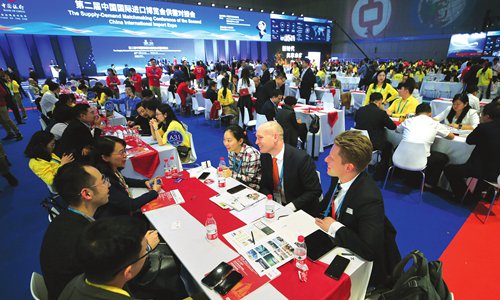HOME >> BUSINESS,SPECIAL-COVERAGE
CIIE a platform against protectionism
By Wang Cong in Beijing and Xie Jun in Shanghai Source:Global Times Published: 2019/11/6 22:23:40
WTO reforms, trade liberalization hot topics in Shanghai

Buyers and sellers talk business at a supply-demand matchmaking conference during the CIIE on Wednesday. Photo: Yang Hui/GT
The China International Import Expo (CIIE) was designed to offer a platform for foreign companies to sell their products and services directly into the Chinese market, but with protectionism on the rise, it has evolved into a critical global battleground to defend the multilateral free trade system.
That shift was palpable inside and on the sidelines of the second CIIE, which officially kicked off on Tuesday in Shanghai, where world leaders and business executives decried unilateral and protectionist actions, most notably from the US. They also warned of more damage to the global economy from rising trade tensions and called for action to preserve multilateral and free trade.
Rejecting protectionism
On Wednesday, even as companies were busy making deals and as public announcements of intended deals constantly flared inside the exhibition halls, calls for boosting global cooperation and lowering trade barriers were loud and clear.
"Trade liberalization and facilitation is definitely needed by multinational companies, which require a stable, predictable global environment in which to make decisions," Yang Yuanqing, CEO of Chinese computer manufacturer Lenovo, told the Global Times on Wednesday. "We will always support globalization and multilateralism."
Yang's comment expressed the overwhelming sentiment at the CIIE that economic globalization and free trade must be preserved.
"Basically, everywhere I go, I hear some form of criticism of the US' unilateralism and protectionism," Bai Ming, a research fellow at the Chinese Academy of International Trade and Economic Cooperation who is attending the CIIE, told the Global Times on Wednesday.
"The CIIE has indeed become a platform for not just business deals but for defending multilateralism and free trade."
Chinese President Xi Jinping set the tone for the rejection of unilateralism and protectionism during a speech at the opening of the CIIE on Tuesday morning. "We need to stand firm against protectionism and unilateralism," he said, underscoring China's unwavering commitment to free trade.
The president's call was echoed by world leaders and corporate executives. "Should we just give up on such a trade order and resort to unilateralism and tariffs or the law of the jungle? Is that the way forward? I don't think so," French President Emmanuel Macron said in a speech at the CIIE's opening on Tuesday.
Concrete actions
In more concrete moves, China hosted a series of events on the sidelines of the CIIE to highlight its commitment toward the multilateral trade system, including an informal ministerial level meeting of 33 WTO members.
The meeting, attended by officials from the WTO and China, the EU, Russia, India and other members, was focused on reforms for the WTO, among other topics, according to the Chinese Ministry of Commerce.
"Participating ministers or representatives affirmed that they should firmly support the rules-based multilateral trade mechanism," the ministry said in a statement on Tuesday.
Speaking at the meeting, WTO Director-General Roberto Azevedo called on members to make clear contributions, with the global economy beset by tensions and uncertainty surrounding trade.
"We can show that the multilateral trading system can deliver meaningful results. We can demonstrate that members are able to come together and reach decisions that enhance certainty and predictability in the 21st century global economy," Azevedo said.
Huo Jianguo, vice chairman of the China Society for World Trade Organization Studies who attended the meeting at the CIIE, said that the discussions offered a "useful platform" for members to communicate about "how we can move forward regarding WTO reforms."
"By holding these meetings, China is able to help build consensus among countries at different developmental stages to push for reforms at the WTO, which is one of the most important issues for safeguarding the multilateral trade system," Huo told the Global Times on Wednesday.
Stark warnings
The widespread denunciation of unilateralism and protectionism at the CIIE came as fresh signs suggested that trade tensions have weighed on the global economy and could inflict more damage if they continue to escalate.
As the CIIE convened on Tuesday, the UN's Conference on Trade and Development issued a stark warning in a report that the US-initiated trade war with China has been a "lose-lose situation for both countries and the wider world," with US consumers and companies bearing the most of the cost of higher US tariffs on Chinese products.
Chinese and US trade negotiators are continuing consultations as they apparently aim to sign an interim trade agreement in the near future, though details remain murky as to when and where such a deal could be reached.
The WTO also released the Chinese version of its annual report, in which it significantly lowered its forecast for global trade growth in 2019 to 1.2 percent year-on-year from its previous estimate of 2.6 percent year-on-year, citing policy uncertainty.
The report called for more cooperation on services trade, noting that this type of trade is expected to account for 50 percent of total global trade by 2040.